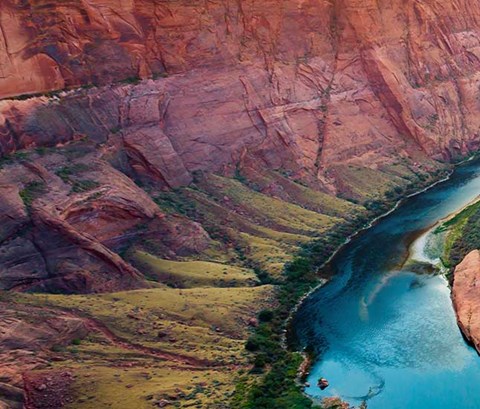Start date:
Course information
Typical offer AAB
UCAS code F601
Institute code L34

Accredited by the Geological Society of London

Ranked 1st in subjects aligned to Geology for ‘overall positivity’ in the NSS 2025 (according to Times Higher Education NSS 2024 methodology applied to the NSS 2025 data).
Course description
Course description
Our Geology degrees gives you a broad training in the geosciences, from the structure and history of our planet and life on Earth, to the natural resources that geologists need to manage for a sustainable future. You may have already discovered that every rock tells a fascinating story: perhaps it was formed in a volcano, or preserves dinosaur remains, or a chemical signature of past oceans, or a rare mineral with high-tech applications. Our Geology degree helps you piece it all together to arrive at a profound understanding of our planet and the role of the geoscientist in today’s world.
The first year lays the foundations by introducing you to the full spectrum of geoscience topics, including the rock cycle, palaeontology, natural resources, and geological maps. You will undertake a field trip to the beautiful Isle of Arran in Scotland where you can put into practice everything you have learn on campus. In the second year you will develop your skills and understanding, and in the third year, develop specialist expertise to help realise your potential. You can choose optional modules to reflect your developing interests, and take field trips to UK and overseas locations. By choosing the Geology degree, you will have more option choices than students on specialist degree streams, though it’s easy to change at the end of the first year if you discover a particular interest in palaeontology or applied and environmental geology. Explore the different modules in detail using the links on this page.
BSc or MGeol: what's the difference?
Apply for a BSc degree if you want an ideal three-year route to becoming a professional geologist or you’re looking to pursue further geological studies through a specialist MSc course.
Apply for a four-year MGeol degree if you are looking to fast-track your professional geological employment or to continue on to PhD research after graduation. MGeol courses include a major cutting-edge independent research project on a topic chosen by you, giving you the opportunity to work with specialist analytical facilities, learn the skills required to succeed in a research environment and potentially see your work published in a peer-reviewed journal. Plus you may be able to spend your third year abroad.
It is possible to transfer between the BSc and the MGeol up to the end of year two.
Entry requirements
Entry requirements
- A-levels: AAB preferably including at least two from: Geology, Maths, Biology, Chemistry, Physics, Use of Maths, Computer Science, Environmental Science, or Geography. We also consider one-science profiles with Geology, Maths, Biology, Chemistry or Physics.
- EPQ with A-levels: ABB + EPQ at grade B. A-level subjects preferably including at least two from: Geology, Maths, Biology, Chemistry, Physics, Use of Maths, Computer Science, Environmental Science, or Geography. We also consider one-science profiles with Geology, Maths, Biology, Chemistry or Physics.
- GCSE: Grade C/4 in English Language and Maths.
- Access to HE Diploma: Pass science diploma with a minimum of 45 credits at level 3, 30 of which must be at Distinction. To include Physics, Chemistry and Maths Level 3 credits.
- International Baccalaureate: Pass Diploma with 30 points, including grade 5 in two science subjects at HL. Minimum of 3 in HL Maths or 4 in SL Maths required if grade 4/C not held at GCSE. Must include a minimum of grade 4 in English A or 5 in English B if minimum of grade 4/C not held in English Language at GCSE.
- BTEC Nationals: Pass Diploma with DDD. Must be in a science related subject, eg. Applied Science, Engineering, Computer Science. Please contact School regarding eligibility.
- T Levels: Distinction in Science (with an Occupational Specialism in Laboratory technician).
Other official national and international qualifications considered from across the world. You can review some of the qualifications we accept on our countries page and English Language equivalencies.
If your qualification or country is not listed, please contact us for more information, including the name and result of the qualification you have studied.
If you do not meet the entry requirements for this course, you can apply for Geology with Foundation Year BSc.
Flexible entry requirements
We welcome applications from motivated students whose predicted grades are slightly below our standard entry requirements. We understand that predicted grades are not always an accurate reflection of your final results, and we’re happy to consider your application. Although we can’t guarantee an offer due to the high volume of applications, if you’re eligible, we may still offer you a place based on our standard requirements.
Contextual offers
The University of Leicester is committed to providing equitable opportunities for all applicants from all backgrounds. We make contextual offers to support students who may be impacted by the area they live in, their personal circumstances or who have completed one of our progression programmes. These offers are usually one or two grades lower than the standard entry requirements. To qualify for a contextual offer, you must apply for an eligible course and meet specific criteria – check if you’re eligible.
Selection process
When considering your application, we will look for evidence that you will be able to fulfil the objectives of the course and achieve the standards required. We will take into account a range of factors including previous exam results.
If you receive an offer you will be invited to visit the School.
English Language Requirements
IELTS 6.0 or equivalent. If your first language is not English, you may need to provide evidence of your English language ability.
If you do not yet meet our requirements, our English Language Teaching Unit (ELTU) offers a range of courses to help you to improve your English to the necessary standard.
International Qualifications
Find your country in this list to check equivalent qualifications, scholarships and additional requirements.
Countries listFees and funding
Fees and funding
UK Students
Starting in 2026
- £9,790 in your first year, subject to Parliamentary approval.
- For the 2027/28 academic year, the Home UK tuition fee is expected to be £10,050, subject to Parliamentary approval. Further increases are anticipated to be implemented automatically through government legislation, therefore it is likely that your tuition fees will rise for each subsequent year of your studies.
Find out more about tuition fees, including year abroad, placement years, scholarships and funding.
International Students
Starting in 2026
- £25,100 per year
If you are resident outside the UK and the Republic of Ireland, you will need to pay a deposit to secure your place. This will be subtracted from your total tuition fee.
Find out more about tuition fees, including year abroad, placement years, scholarships and funding.
Accreditation
Accreditation
All our degrees are accredited by the Geological Society of London, the professional body for geologists in the UK. Their accreditation panel said that our courses are “excellent” and they were “particularly impressed by the amount of fieldwork undertaken.”
Careers and employability
Careers and employability
All of our Geology degrees will provide you with the knowledge, technical and transferable skills required to achieve your professional goals. You’ll also benefit from a dedicated Careers Tutor with many years’ experience as an industry geologist.
Our annual Geology Careers Day is attended by a wide range of companies from across the geoscience sector. More than 50 companies are actively involved with Geology at Leicester, from funding major research projects to work experience opportunities.
Graduate destinations
Many of our graduates work as geoscientists involved in discovering, extracting and developing energy, mineral and water resources. Leicester graduates are also employed in the environmental sector, addressing issues of climate change, sustainability, waste management, environmental monitoring and remediation.
Some graduates have moved directly into other professions (e.g. teaching, banking, the media, management and the police). And around a quarter of our graduates go on to do further study for a Masters or a PhD.
Careers and Employability Service
Get career-ready at Leicester with guidance from our award-winning Careers and Employability Service. We're here to give you a lifetime offer of support, even after graduation. Our team of specialist careers advisers and mentors will help you every step of the way. From supporting you with CVs and interviews, to volunteering opportunities and placements, we're here to help you reach your professional goals.
Sustainable Development Goals
Sustainable Development Goals
We are committed to providing skills and knowledge to help prepare you tackle global challenges. We have mapped our undergraduate degrees for learning which aligns to the 17 UN Sustainable Development Goals.
This degree includes learning which relates to the following UN Sustainable Development Goals:
- Goal 3: Health and well-being
- Goal 9: Industry, innovation and infrastructure
- Goal 12: Responsible consumption and production
- Goal 13: Climate action
- Goal 15: Life on land
Testimonial
 “Studying Geology has given me the ability to develop skills needed for everyday life and memories that will last a lifetime. The constant support and feedback from staff give you a sense of belonging and the ambition to show your best self. My passion to work in the outdoors has been enhanced by the opportunities to go on field trips and experience geology hands on in the field. The field trips, especially Tenerife and my field-based project, have provided me with self-belief in my own work and long-lasting friendships.”
“Studying Geology has given me the ability to develop skills needed for everyday life and memories that will last a lifetime. The constant support and feedback from staff give you a sense of belonging and the ambition to show your best self. My passion to work in the outdoors has been enhanced by the opportunities to go on field trips and experience geology hands on in the field. The field trips, especially Tenerife and my field-based project, have provided me with self-belief in my own work and long-lasting friendships.”
Sam – Geology MGeol student, 2024
Course structure
Year 1
Year 1
You will have a broad introduction to geoscience and discover the role of geology and geoscientists in today's society.
Modules
- First Year Tutorials
- Evolution of the Earth System
- Palaeobiology and the Stratigraphic Record
- Natural Resources and Energy for the 21st Century
- Geological Maps and Structures
- Introductory Field Course
- From Core to Crust
- Our Dynamic Planet
It is possible to transfer to the MGeol in Geology with Palaeontology at the end of Year 1 if you wish to. This is the same as Year 1 of the BSc.
The modules listed reflect those currently available to students. Every year, we review our modules and their content to ensure that our courses maintain the best academic and student experience possible. Whilst this does mean elements of your course may change in future academic years, it ensures your course is giving you a research-inspired education and preparing you for your future.
Year 2
Year 2
You will learn about more advanced aspects of geosciences such as the conditions required to form magmatic, metamorphic, and sedimentary rocks.
Core modules
- Geological Fieldwork: Methods and Applications
- Mapping Earth’s History: structural and stratigraphic field techniques
- Magmatic and Metamorphic Processes
- Climate Change: Impacts, Vulnerability and Adaptation
- Introduction to Geochemistry
- Structure and Tectonics
- Depositional Processes and Environments
Option modules
Choose one option module from:
This is the same as Year 2 of the BSc. At the end of Year 2 your performance must meet a set level to continue on the MGeol. If this is not the case, you will transfer to the BSc and complete your degree in three years.
The modules listed reflect those currently available to students. Every year, we review our modules and their content to ensure that our courses maintain the best academic and student experience possible. Whilst this does mean elements of your course may change in future academic years, it ensures your course is giving you a research-inspired education and preparing you for your future.
Optional Year in Industry
Optional Year in Industry
If you want to, you can take a year out between Years 2 and 3 (or Years 3 and 4) of your course and spend that time working in industry.
If you choose to do this, you’ll take a module in your second year that will help you to find a work placement and prepare you for the workplace. Throughout your placement, there will be structured support available to you from specialist staff at the University.
You’ll benefit from real-world experience in a commercial setting, enabling you to make an easier transition from studying to working after you finish your degree. It will also strengthen your CV significantly in preparation for entering the graduate labour market. On top of all this, you’ll be paid a salary for your placement.
The modules listed reflect those currently available to students. Every year, we review our modules and their content to ensure that our courses maintain the best academic and student experience possible. Whilst this does mean elements of your course may change in future academic years, it ensures your course is giving you a research-inspired education and preparing you for your future.
Year 3 (or Optional Year Abroad)
Year 3 (or Optional Year Abroad)
In your third year you can choose to stay in Leicester, in which case your third year will be the same as the final year of the BSc. During this year you will have the opportunity to take your degree in the direction that you want. The core modules will ensure that you are advancing in the essential areas of geology. Optional modules provide the chance to continue with the fundamental principles of geology at an advance level or specialise in the areas that fascinate you.
Core modules
Option modules
Choose two option modules from:
- Environmental Geoscience
- Diversity and Evolution of Vertebrates
- Crustal Dynamics
- Sustainability Enterprise Partnership Project
Then choose three option modules from:
- Planetary Science
- The Forensic, Archaeological and Geological Application of Microfossils
- Mineral Exploration, Economics and Sustainability
- Mineral Resources for Net-Zero Carbon 2
- Stable Isotopes in the Environment
- Water Quality Processes and Management
- The Mining Lifecycle Field Course – Cornwall
- Key Events in the Evolution of Planet Earth Viewed Through the Geological Lens of Wales - a field course
- Physical Volcanology
This is the same as the final year of the BSc.
Year Abroad
If you want to, you can spend your third year studying abroad at one of our partner institutions (eligibility is dependent on your academic performance in Years 1 and 2).
NB. A year spent abroad still incurs a tuition fee, but this is much lower than for a normal year at Leicester. See our Fees and Funding section for details. If you are eligible for a loan from Student Finance you can apply for a travel grant from them.
Studying abroad is not just for people who are interested in travelling and meeting new people. It is about acquiring life skills that are becoming increasingly significant for a wide range of jobs in our modern globalised society. Whether you go on to work in the private sector, the state sector, a non-governmental organisation or become self-employed you will find the experience invaluable. Find out more from our Study Abroad Unit.
Geology at Leicester has links with the University of Canterbury in Christchurch, New Zealand - Explore the stunning Southern Alps, geothermal sites, mud pools and geysers, the active volcanoes of the Taupo volcanic zone – and Mount Doom!
To be considered for the year abroad requires a 65% average by the middle of your second year. Places are limited, competition is high, and selection is based on academic thresholds.
The modules listed reflect those currently available to students. Every year, we review our modules and their content to ensure that our courses maintain the best academic and student experience possible. Whilst this does mean elements of your course may change in future academic years, it ensures your course is giving you a research-inspired education and preparing you for your future.
Final Year
Final Year
During your final year you will concentrate on specialising within a predominantly optional module structure. Your research project will be an opportunity to delve into an area of geoscience that has captured your interest during the first three years under the supervision of our highly accomplished staff members.
Core modules
Option modules
- Advanced Field Course
- Anthropogenic Impact on the Urban Environment
- Ore Genesis
- Evolutionary Palaeobiology
- Igneous Petrogenesis
- Fundamentals of GIS
- Fundamentals of Data Science
- Living the Anthropocene
The modules listed reflect those currently available to students. Every year, we review our modules and their content to ensure that our courses maintain the best academic and student experience possible. Whilst this does mean elements of your course may change in future academic years, it ensures your course is giving you a research-inspired education and preparing you for your future.
Fieldwork
Fieldwork
Fieldwork can be one of the most stimulating and enjoyable experiences of your time on a Geology degree. Your field experience begins in the very first week of your studies with a day spent investigating the fascinating local geology of Leicestershire.
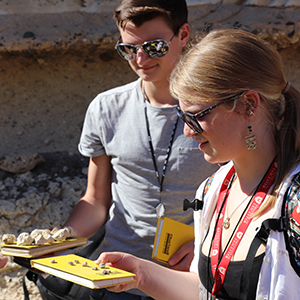
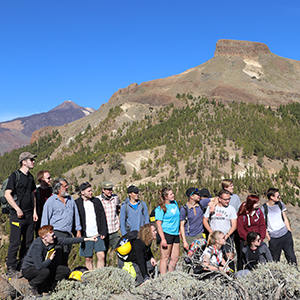
In year one, the Introductory Field Course takes place on Arran, a Scottish island with more geological variety per square kilometre than virtually anywhere else in the world. You’ll rapidly develop observation and recording skills through active participation in scientific discovery.
In your second year you will focus on developing the skills that will enable you to carry out your own geological fieldwork in a variety of terrains. We’ll guide you through this with field trips to Spain and Anglesey.
In your third year, you will carry out an Independent Field-based Project. You get to choose your own field area, allowing you to develop your geological interests (and showcase an impressive range of transferable skills!). Depending on the specialist modules you choose, there are also trips available to Tenerife, Cornwall and Pembrokeshire.
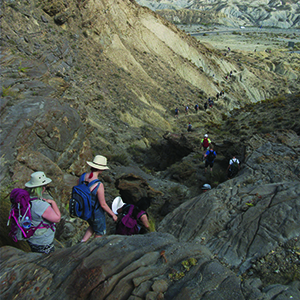
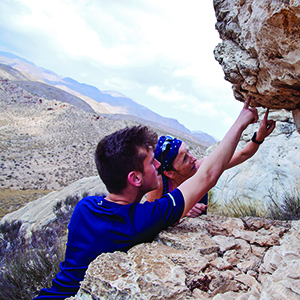
If you study for (or transfer onto) a four-year MGeol course, your final year has an optional residential field course. Some research projects can involve fieldwork, too.
And you’ll be pleased to know our staff are involved in field-based research worldwide, ensuring that our teaching draws on active field experience.
All of our core (years one and two) field course costs are largely subsidised by the University of Leicester and we ask only for annual contributions of £100 in Year 1 and £250 in Year 2. Optional third year field courses do come with additional costs, although there are bursaries available.
Fieldwork locations may vary and are subject to availability.
The modules listed reflect those currently available to students. Every year, we review our modules and their content to ensure that our courses maintain the best academic and student experience possible. Whilst this does mean elements of your course may change in future academic years, it ensures your course is giving you a research-inspired education and preparing you for your future.
Why Leicester?
Job prospects are excellent: 95% of our Geology students are employed (or studying for a Masters degree) six months after graduating. (DLHE)
All our degrees are accredited by the Geological Society of London. They said that our courses are “excellent” and they were “particularly impressed by the amount of fieldwork undertaken”.
Your degree will take you to geologically fascinating locations across the UK and further afield, starting with a Year 1 trip to the Isle of Arran.
Ranked top 3 in subjects aligned to Geology for ‘Teaching on my course’, ‘Learning opportunities’ and ‘Student voice’ in the NSS 2025 (according to Times Higher Education NSS 2024 methodology applied to the NSS 2025 data). View the NSS questions all students were asked for individual themes.
Teaching and learning
Teaching
You will be taught through a mixture of lectures, tutorials, seminars, practicals and fieldwork. All lecture material is available online through our virtual learning environment Blackboard. Residential field trips are run by academic staff throughout the degree and provide extended periods of small group teaching in field contexts.
Assessment
You will be assessed through a combination of coursework, fieldwork, independent reports and projects, seminars, oral and poster presentations and computer-based tests, as well as formal exams.
We place a strong emphasis on safety training, time management, and student initiative.
Your personal tutor will provide you with individually tailored academic support throughout your degree. You will receive non-assessed feedback on every module to help you improve and prepare for your assessed work.
Through the Student-Staff Committee you can raise any issues relating to your studies and suggest course developments.
Independent learning
When not attending lectures, seminars or other timetabled sessions you will be expected to continue learning independently through self-study. Typically, this will involve reading journal articles and books, working on individual and group projects, undertaking research in the library, preparing coursework assignments and presentations, and preparing for exams. To help with your independent learning, you can access the Library and our social study spaces in halls of residence.
Academic support
Our Centre for Academic Achievement provides help in the following areas:
- study and exam skills
- academic writing
- presentations
- dissertations
- numerical data skills
- referencing sources
Our AccessAbility Centre offers support and practical help for students with dyslexia or other specific learning difficulties, including physical, mental health or mobility difficulties, deafness, or visual impairment.
Teaching staff
You will be taught by an experienced teaching team whose expertise and knowledge are closely matched to the content of the modules on the course. PhD research students who have undertaken teacher training may also contribute to the teaching of seminars under the supervision of the module leader. Our teaching is informed by the research we do. You can learn more about our staff by visiting our staff profiles.
Apply now
| Course | Qualification | Duration | UCAS Code | Availability |
|---|---|---|---|---|
| Course Geology | Qualification MGeol | Duration 4 years full-time | UCAS Code F601 | Availability How to apply |
| Course Geology with a year abroad | Qualification MGeol | Duration 4 years full-time | UCAS Code F601 | Availability How to apply |
| Course Geology with a Year in Industry | Qualification MGeol | Duration 5 years full-time | UCAS Code F601 | Availability How to apply |
Data about this course

There is a real sense of community within Geology. The lecturers are incredibly approachable.
